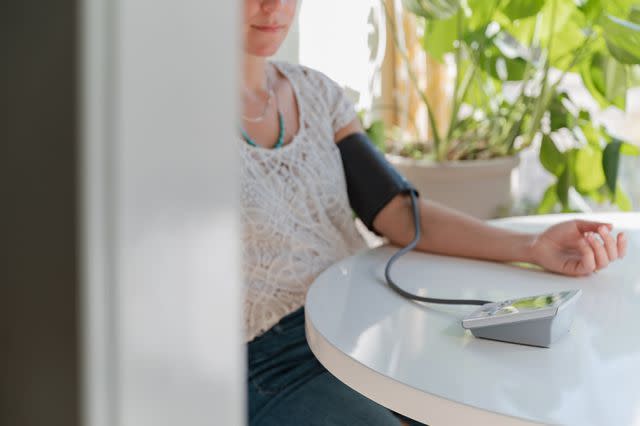Do You Need to Monitor Your Blood Pressure at Home?

jamie grill atlas/Stocksy
Blood pressure readings can vary widely between doctor's visits, new research shows.
The findings further suggest that supplemental home monitoring may be helpful for some people with high blood pressure.
Nearly half of U.S. adults have high blood pressure, or hypertension, and only one in four have it under control.

jamie grill atlas/Stocksy
Having blood pressure checked at a doctor’s appointment is routine, but new research shows that infrequent measurements may not be enough to paint an accurate picture of someone’s health.
The study, published earlier this month in the journal Circulation: Cardiovascular Quality and Outcomes, found that blood pressure readings on average varied about 11 mm HG for systolic blood pressure, the first number in a blood pressure reading.
Researchers found that for people with normal blood pressure, their readings would change by an average of 6.3 mm Hg between two visits. But for people with extremely high blood pressure, readings would swing by an average of 32.3 mm Hg between visits.
This makes it all the more challenging to determine if someone’s blood pressure is in a normal range, especially for those with hypertension if prescribed treatments are working to lower their blood pressure.
So should you consider checking your blood pressure in between doctor’s visits? Some experts believe it could be a good idea.
“If the blood pressure is varying from visit to visit, it can make it a little bit harder to diagnose—does someone really have high blood pressure or not?” Deepak Bhatt, MD, MPH, director of Mount Sinai Heart and the Valentin Fuster professor of cardiovascular medicine at the Icahn School of Medicine at Mount Sinai, told Health. “In that case, in particular, it can be useful to get home blood pressure measurements.”
Here’s what experts had to say about why blood pressure can change so drastically, how often a person should be measuring it, and how to get the most accurate results possible, both in the clinic and at home.
Blood Pressure Measurements Can Vary Widely
The study looked at blood pressure measurements for 537,218 adults, all treated in the Yale New Haven Health System for at least two visits between 2014 and the fall of 2018. On average, patients visited the doctor 13 times over an average of 2 and a half years.
With the variation in blood pressure readings—especially for people with high blood pressure—the study found that it would be difficult for providers to accurately assess someone’s blood pressure. Researchers estimated that, after someone with hypertension was prescribed medication, it would take four follow-up visits to be 80% certain that their blood pressure was actually going down to normal levels.
This information isn’t necessarily a shock to the health community, however.
“It’s something we’ve actually known for a long time, but it was nicely shown in this particular study. Blood pressure varies from minute to minute and from hour to hour,” Daniel Weiner, MD, nephrologist and hypertension specialist at Tufts Medical Center, told Health.
“There are a lot of reasons why blood pressure, at any one minute in time, may not be representative of blood pressure at many other periods of time,” he continued.
At any point, there can be a number of factors that might make someone’s blood pressure seem higher than it really is normally.
Sometimes people get nervous at the doctor’s office, which makes their blood pressure go up—this is termed “white coat hypertension,” Dr. Bhatt and Dr. Weiner said. Walking up the stairs or having an extra cup of coffee can elevate someone’s blood pressure momentarily, Dr. Weiner said, and so can stress from sitting in traffic or taking over-the-counter pain relievers, noted Dr. Bhatt.
Because of all of these factors, it can be really challenging for doctors to know if someone’s elevated blood pressure is different than it was during their last visit due to an actual medical concern or simply because of nerves or another factor.
“If I take your blood pressure now, in just a minute later, under the exact same conditions it’s going to vary. And blood pressure is designed to do that, that in itself isn’t a problem. But the challenge is,” Dr. Bhatt said, “which one do you believe?”

 Yahoo Autos
Yahoo Autos 